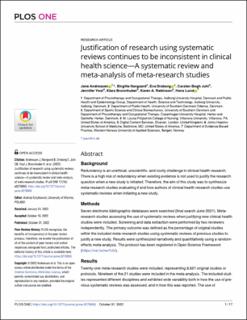| dc.contributor.author | Andreasen, Jane | |
| dc.contributor.author | Nørgaard, Birgitte | |
| dc.contributor.author | Draborg, Eva | |
| dc.contributor.author | Juhl, Carsten Bogh | |
| dc.contributor.author | Yost, Jennifer | |
| dc.contributor.author | Brunnhuber, Klara | |
| dc.contributor.author | Robinson, Karen A. | |
| dc.contributor.author | Lund, Hans Aage | |
| dc.date.accessioned | 2023-03-17T13:18:26Z | |
| dc.date.available | 2023-03-17T13:18:26Z | |
| dc.date.created | 2022-11-29T13:27:21Z | |
| dc.date.issued | 2022 | |
| dc.identifier.citation | PLOS ONE. 2022, 17 (10), . | en_US |
| dc.identifier.issn | 1932-6203 | |
| dc.identifier.uri | https://hdl.handle.net/11250/3059039 | |
| dc.description.abstract | Background
Redundancy is an unethical, unscientific, and costly challenge in clinical health research. There is a high risk of redundancy when existing evidence is not used to justify the research question when a new study is initiated. Therefore, the aim of this study was to synthesize meta-research studies evaluating if and how authors of clinical health research studies use systematic reviews when initiating a new study.
Methods
Seven electronic bibliographic databases were searched (final search June 2021). Meta-research studies assessing the use of systematic reviews when justifying new clinical health studies were included. Screening and data extraction were performed by two reviewers independently. The primary outcome was defined as the percentage of original studies within the included meta-research studies using systematic reviews of previous studies to justify a new study. Results were synthesized narratively and quantitatively using a random-effects meta-analysis. The protocol has been registered in Open Science Framework (https://osf.io/nw7ch/).
Results
Twenty-one meta-research studies were included, representing 3,621 original studies or protocols. Nineteen of the 21 studies were included in the meta-analysis. The included studies represented different disciplines and exhibited wide variability both in how the use of previous systematic reviews was assessed, and in how this was reported. The use of systematic reviews to justify new studies varied from 16% to 87%. The mean percentage of original studies using systematic reviews to justify their study was 42% (95% CI: 36% to 48%).
Conclusion
Justification of new studies in clinical health research using systematic reviews is highly variable, and fewer than half of new clinical studies in health science were justified using a systematic review. Research redundancy is a challenge for clinical health researchers, as well as for funders, ethics committees, and journals. | en_US |
| dc.language.iso | eng | en_US |
| dc.publisher | Public Library of Science | en_US |
| dc.rights | Navngivelse 4.0 Internasjonal | * |
| dc.rights.uri | http://creativecommons.org/licenses/by/4.0/deed.no | * |
| dc.title | Justification of research using systematic reviews continues to be inconsistent in clinical health science—A systematic review and meta-analysis of meta-research studies | en_US |
| dc.type | Peer reviewed | en_US |
| dc.type | Journal article | en_US |
| dc.description.version | publishedVersion | en_US |
| dc.rights.holder | © 2022 Andreasen et al. | en_US |
| dc.source.pagenumber | 17 | en_US |
| dc.source.volume | 17 | en_US |
| dc.source.journal | PLOS ONE | en_US |
| dc.source.issue | 10 | en_US |
| dc.identifier.doi | 10.1371/journal.pone.0276955 | |
| dc.identifier.cristin | 2084053 | |
| cristin.ispublished | true | |
| cristin.fulltext | original | |
| cristin.qualitycode | 1 | |

